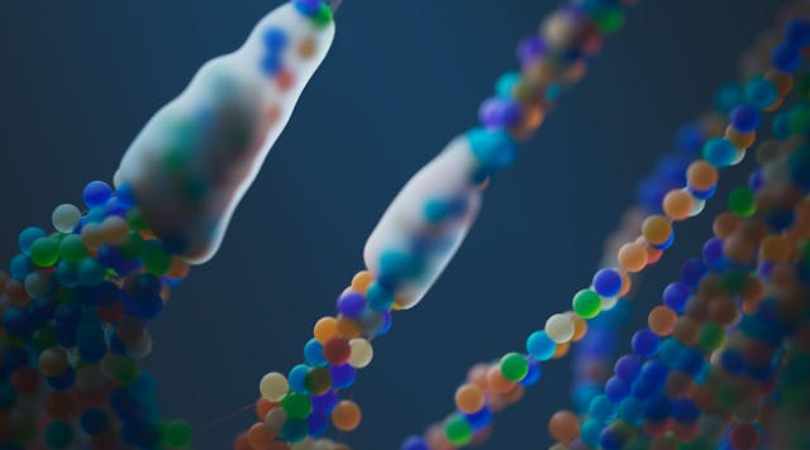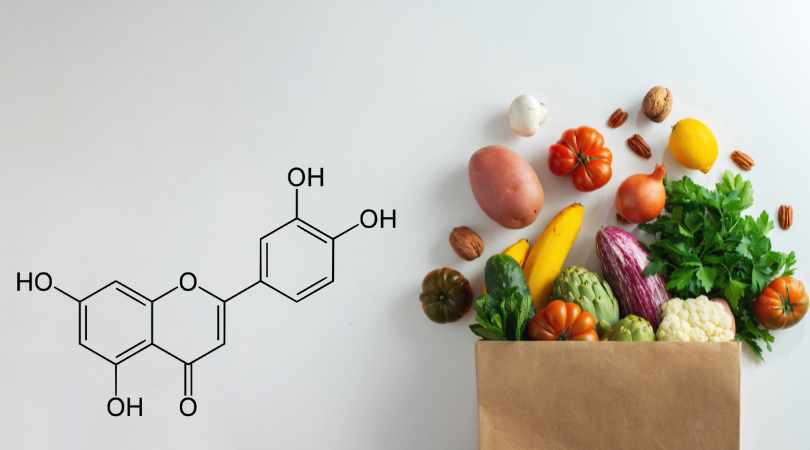Scientists have successfully restored the lost uricase enzyme, a key breakthrough in combating fructose-induced fat formation. This discovery offers new hope for preventing obesity and metabolic disorders by targeting how the body processes sugar and stores fat.
Limited Quantities Available! Order Today and Enjoy Free Shipping on Orders Over $100!
Luteolin
A natural flavonoid studied for its ability to block fructokinase, reduce inflammation, and restore metabolic balance.
Luteolin: A Natural Ally for Modern Metabolism
Luteolin is more than an antioxidant—it’s one of the few natural compounds studied for its ability to interrupt harmful fructose pathways.
Luteolin is emerging as a promising natural compound for addressing fructose-driven metabolic diseases, offering antioxidant, anti-inflammatory, and lipid-modulating effects that may help restore metabolic resilience. These benefits make it especially relevant in a world where fructose exposure—both dietary and internal—is nearly constant.
That’s why we made it the foundation of SugarShield. By delivering a high dose of bioavailable luteolin, SugarShield helps support healthy fructose metabolism and restore the balance your cells are meant to maintain.
Explore SugarShieldShort Definition
A natural flavonoid studied for its ability to block fructokinase and restore metabolic balance.
What is Luteolin?
Luteolin is a naturally occurring flavonoid (a plant compound polyphenol known for its contributions to taste and color) found in a variety of plant-based foods, including: celery; parsley; chamomile tea; thyme; artichokes; green peppers. It has been studied as a potential contributor to human metabolism with recent research uncovering an even more intriguing role – its ability to modulate metabolic pathways, particularly those driven by fructose metabolism.
Luteolin is a plant secondary metabolite (PSM), meaning that it works as a natural contributor to ecological advantages, such as defense, signaling, or stress adaptation. For ages its biological activity has led to its extensive use in traditional medicine and culinary purposes. Some plants containing luteolin or other PSMs were called “medical” for their beneficial properties. However, naturally the amount of PSMs in plant cells is very low and impure, resulting in manufacturing their derivatives in modern medicine.
Luteolin Biochemistry
Luteolin, as a flavonoid, is a very effective bioactive chemical constituent of edible plants (Nabavi et al., 2015). It has been long studied for its potent antioxidant, anti-inflammatory, and neuroprotective properties. This is because luteonin is able to neutralize free radicals, reducing oxidative stress and cellular damage.
As a member of the polyphenol family – large class of plant-derived compounds characterized by the presence of multiple phenolic groups, which give them the ability to interact with proteins, enzymes, and cell signaling pathways – luteolin shows promising results in treatment of metabolic syndromes, including those related to fructose metabolism.
Luteolin is insoluble in water. Even though it has hydroxyl group (OH) that is able to create bonds with water, it has a strong non-polar flavone skeleton (Nabavi et al.,2015). Therefore, the structure of the whole molecule is hydrophobic, meaning that it has low natural bioavailability in our body. One of the strategies used by SugarShield to improve luteolin’s bioavailability is liposomal delivery. Lipid vesicles encapsulate hydrophobicluteolinand transports it to the targeted location protecting from early metabolism. This increases absorption and beneficial effects (Wu et al., 2018).
Luteolin and Fructose Metabolism
With the modern problem of fructose overconsumption, that leads to metabolic dysfunctions and increased levels of uric acid, SugarShield aims to target the very beginning of the process – the enzyme fructokinase, the “on switch” for fructose metabolism in the liver (Andres-Hernando et al., 2020). Unlike many polyphenols, luteolin appears to have a targeted impact on fructokinase (Spiegel, 2023).
Preclinical studies suggest that luteolin can reduce fructokinase activity increasing urinary fructose excretion. It happens because luteolin’s structure allows it to bind to the fructokinase’s active site (instead of fructose) decreasing or inhibiting its activity. It results in much slower or no fructose metabolism and no ATP (cell energy) depletion. No fructokinase – no fructose phosphorylation using ATP – no fructose-1-phosphate – no uric acid, metabolic dysfunction, triglycerides, lipogenesis (fat storage).
This puts luteolin at the center of a new wave of metabolic research aimed at addressing problems like non-alcoholic fatty liver disease (NAFLD), insulin resistance, and metabolic syndrome at the source – not just treating symptoms after damage has occurred.
Luteolin Benefits Beyond Fructose
In addition to its role in impairing fructose metabolism, luteolin is being explored for a wide range of other potential benefits:
- Antioxidant: it reduces oxidative stress and cellular damage by neutralising free radicals.
- Anti-inflammatory: as a polyphenol it interacts with cellular signalling pathways, especially of mast cells, having the ability to suppress inflammatory signaling pathways and pro-inflammatory cytokines (It inhibits key inflammatory pathways, including NF-κB and IL-6, both of which are upregulated in metabolic diseases)
- Cardioprotective: Improve blood vessel function, lower blood pressure, reduce LDL oxidation.
- Neuroprotective: may protect amino acids of brain cells from degeneration. Shows promising protective results from diseases like Alzheimer’s and Parkinson’s by reducing neuroinflammation and neuron oxidative stress. Luteolin as well may help reduce brain fog and cognitive decline by lowering inflammation in the brain and supporting mitochondrial function in neurons.
- Anticancer (studied): influences cell (tumor) growth, induces apoptosis, and suppresses angiogenesis.
- Mitochondrial support: Luteolin helps preserve ATP levels by reducing oxidative stress, making it valuable for maintaining energy production at the cellular level.
The Altilix Study: Clinical Evidence
The Altilix study is a six-month controlled investigation on the potential benefits of a supplement containing luteolin (Castellino et al., 2019). The double-blind, placebo-controlled clinical trial aims to provide human data of beneficial properties of luteolin-rich artichoke extract. Altilix is a standardized formula of artichoke-derived nutraceutical rich in chlorogenic acid and luteolin derivatives.
The study has shown that luteolin provides significant improvements of health of patients with non-alcoholic fatty liver disease (NAFLD): the direct effect on fat by reduction of triglycerides that are central to NAFLD pathogenesis. These improvements occurred even when weight reduction of patients was modest, suggesting a direct effect on lipid metabolism, not just secondary to weight loss. For now we do not have a specific treatment targeting NAFLD, but with luteolin it is possible to achieve progression of NAFLD treatment beyond the lifestyle medication. Moreover, Altilix study has shown that luteolin has been proven to improve anti-inflammatory effects. This happens because of the antioxidant effects of luteolin presented in artichoke leaves that protects liver cell membranes, reduce fat-related oxidative damage, and improve bile-driven fat metabolism.
On top of that, the study found out that supplementation with Altilix leads to increased amounts of the hormone ghrelin that increases food intake and fat mass, acting at the level of the hypothalamus (appetite control). The rise in ghrelin suggests a broader metabolic-hormonal benefit, countering weight gain and supporting energy balance.
All these effects of luteolin supplementation combined together contributed to the improved insulin sensitivity (through the combined antioxidant, anti-inflammatory, and lipid-modulating actions). This also because luteolin impairs main inflammatory signalling receptors contributing to insulin resistance (NF-κB, TNF-α, IL-6), leading to the significant improvements in glucose metabolism.
Therefore, these findings support the hypothesis that luteolin can help reverse metabolic dysfunction, especially when fructose metabolism is involved.In Liv3Health we believe that educating people on potential benefits of luteolin may contribute to better health and improved lifestyle.
Why Luteolin Matters in the Modern Diet
Today’s environment is saturated with triggers for endogenous fructose production—from refined carbohydrates to salty foods, stress, and dehydration. Our life is filled with hidden fructose: sugary drinks containing high fructose corn syrup, highly processed foods. We overconsume fructose unconsciously, which triggers the loop of metabolic dysfunctions driven by fructokinase activity (Jung et al.,2022). Even people who avoid added sugar may still experience endogenous fructose synthesis – when your body generates fructose internally from glucose, triggered by stress, high glucose or salt intake, or dehydration – by activating the polyol pathway – converting glucose to sorbitol (carbohydrate derived from sugars also known as polyol), which is then converted to fructose (Lanaspa et al., 2014). Therefore, to address harmful fructose metabolism we can target the very beginning of the mechanism - fructokinase, allowing your body to maintain healthier energy production and improve overall metabolic health.
This makes modulating fructose metabolism a daily necessity – not just a diet-based concern. As one of the few natural compounds studied to intervene at the fructokinase step, luteolin may offer a unique advantage: the ability to support metabolic resilience in a world where energy dysfunction is becoming the norm.
Luteolin in SugarShield
Liv3 Health is aiming to address the complex relationship between fructose consumption, metabolic health, and overall well-being, with the goal of finding ways to mitigate potential risks and promote healthier dietary choices through SugarShield. To do this, we developed SugarShield to target fructokinase and block the harmful process from the very beginning. Using liposomal delivery of a bioavailable liposomal form of luteolin we aim to ensure optimal absorption and cellular delivery to help regulate the metabolic effects of fructose – whether it comes from food or your own cells.
It's not just about taking a supplement – it’s about supporting your body at the point where imbalance begins: the moment fructose is metabolized. Whether you’re dealing with insulin resistance, low energy, or unexplained weight gain, understanding the role of luteolin – and fructose – is a smart place to start.
References
- Andres-Hernando, A., Orlicky, D. J., Kuwabara, M., Ishimoto, T., Nakagawa, T., Johnson, R. J., & Lanaspa, M. A. (2020). Deletion of Fructokinase in the Liver or in the Intestine Reveals Differential Effects on Sugar-Induced Metabolic Dysfunction. Cell metabolism, 31(1), 117-127. https://doi.org/10.1016/j.cmet.2020.05.0
- Castellino, G., Nikolic, D., Magán-Fernández, A., Malfa, G. A., Chianetta, R., Patti, A. M., Amato, A., Montalto, G., Toth, P. P., Banach, M., Cicero, A. F. G., Rizzo, M. (2019). Altilix®Supplement Containing Chlorogenic Acid and Luteolin Improved Hepatic and Cardiometabolic Parameters in Subjects with Metabolic Syndrome: A 6 Month Randomized, Double-Blind, Placebo-Controlled Study. Nutrients, 11(11), 2580. https://doi.org/10.3390/nu11112580
- Guixia Wu Jing Li Jinqiao Yue Shuying Zhang Kurexi Yunusi. (2018). Liposome encapsulated luteolin showed enhanced antitumor efficacy to colorectal carcinoma. Molecular medicine reports, 17(2), 2456-2464. https://doi.org/10.3892/mmr.2017.8185
- Jonathan Spiegel. (2023). The potential therapeutic roles of quercetin and luteolin in hereditary fructose intolerance. Medical Hypotheses, 178(111139). https://doi.org/10.1016/j.mehy.2023.111139
- Lanaspa, M. A., Ishimoto, T., Cicerchi, C., Tamura, Y., Roncal-Jimenez, C. A., Chen, W., Tanabe, K., Andres-Hernando, A., Orlicky, D. J., Finol, E., Inaba, S., Li, N., Rivard, C. J.,, & Kosugi, T., Sanchez-Lozada, L. G., Petrash, J. M., Sautin, Y. Y., Ejaz, & A. A., Kitagawa, W., Garcia, G. E., … Johnson, R. J. (2014). Endogenous fructose production and fructokinase activation mediate renal injury in diabetic nephropathy. Journal of the American Society of Nephrology : JASN, 25(11), 2526–2538. https://doi.org/10.1681/ASN.2013080901
- Li, M., Gu, X., Yang, J., Zhang, C., Zhou, Y., Huang, P., Wang, X., Zhang, L., Jiang, L., Zhai, L., Yu, M., Cheng, G., & Yang, L. (2025). Luteolin: A potential therapeutic agent for respiratory diseases. European journal of pharmacology, 999(177699). https://doi.org/10.1016/j.ejphar.2025.177699
- Satish Kumar, Rajni Saini, Priyanka Suthar, Vikas Kumar. (2022). Plant Secondary Metabolites: Their Food and Therapeutic Importance. Plant Secondary Metabolites, 371-413. http://dx.doi.org/10.1007/978-981-16-4779-6_12
- Seyed Fazel Nabavi, Nady Braidy, Olga Gortzi, Eduardo Sobarzo-Sanchez, Maria Daglia, KrystynaSkalicka-Woźniak, Seyed Mohammad Nabavi. (2015). Luteolin as an anti-inflammatory and neuroprotective agent: A brief review. Brain Research Bulletin, 112(A), 1-11. https://doi.org/10.1016/j.brainresbull.2015.09.002
Sunhee Jung, Hosung Bae, Won-Suk Song, Cholsoon Jang. (2022). Dietary Fructose and Fructose-Induced Pathologies. ANNUAL REVIEW OF NUTRITION, 42(2022), 45-66. https://doi.org/10.1146/annurev-nutr-062220-025831






